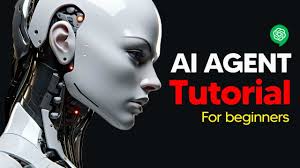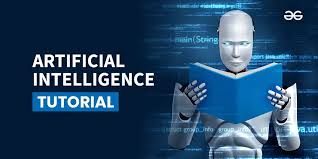INTRODUCTION:
Imagine having a personal assistant that can learn, adapt, and make decisions on its own. Sounds like science fiction, right? Well, welcome to the world of Artificial Intelligence (AI) agents.
In this article, we’ll explore what an AI agent is, how it works, and its exciting applications in various industries. Buckle up, and let’s dive into the fascinating world of AI.
What is an AI Agent?

At its core, an AI agent uses artificial intelligence (AI) to perceive its surroundings, make decisions, and take actions. It collects information from its environment—like a person would gather details before making a choice—and then uses that information to act in a way that achieves specific goals.
For example, if you were to ask an AI agent for restaurant recommendations, it would look at your preferences (like cuisine type or budget), check available options nearby, and suggest places that match your criteria.
How Does an AI Agent Work?

AI agents operate through several key components:
– Perception: This is how the agent gathers information from the world around it. Think of it as the agent’s senses—just like humans use their eyes and ears to understand what’s happening around them.
– Decision-Making: Once the AI agent has the information, it needs to decide what to do with it. This is similar to how you weigh your options when choosing what to eat for dinner.
– Action: After deciding, the agent takes action based on its decision. This could mean sending you a recommendation or even making a purchase on your behalf.
Example: Virtual Shopping Assistant
Imagine you’re looking for a new pair of shoes. You tell your AI shopping assistant what style you want and your budget. The assistant then:
1. Searches online stores for shoes that match your criteria.
2. Compares prices across different websites.
3. Recommends the best options, including links where you can buy them.
This process shows how an AI agent can simplify tasks that would take you much longer if done manually.
Types of AI Agents:
AI agents come in various forms and serve different purposes:
– Customer Service Agents: These are often chatbots that help answer questions and solve problems for customers on websites. For example, if you have a question about your order status, a chatbot can provide instant answers without waiting for a human representative.
– Autonomous Agents: These agents operate independently in physical or digital environments. Think of self-driving cars that navigate traffic without human intervention or robots in factories that assemble products.
– Web Agents: These agents scour the internet for information. For instance, price comparison websites use web agents to find the best deals for products by checking multiple online stores.
Real-Life Applications of AI Agents
AI agents are already making waves in various industries:
1. Healthcare: They can analyze patient data to assist doctors in diagnosing conditions faster and more accurately.
2. Finance: AI agents help manage investments by analyzing market trends and making recommendations based on data analysis.
3. Logistics: In supply chain management, AI agents track shipments and optimize delivery routes in real-time, ensuring packages arrive on time while minimizing costs.
Why Are AI Agents Important?
The rise of AI agents is transforming how we interact with technology and manage tasks in our daily lives. They save time, reduce human error, and enhance efficiency by automating repetitive tasks. As these agents continue to evolve, they will become even more integrated into our everyday activities, making life simpler and more convenient.
In summary, an AI agent is like having a smart helper that learns from experiences and adapts to meet your needs. Whether it’s shopping online or managing complex logistics, these intelligent systems are designed to make our lives easier by handling tasks autonomously and efficiently.
An AI agent operates through a combination of advanced technologies and techniques that allow it to perceive, understand, and interact with its environment. Let’s break down the key components and processes that make an AI agent function effectively.
Key Techniques Used by AI Agents
1. Machine Learning (ML):
– Machine learning is a subset of artificial intelligence that enables an AI agent to learn from data and improve over time without being explicitly programmed for every task.
– For instance, if you have an AI agent that recommends movies, it will analyze your viewing history and preferences to suggest films you might enjoy. The more you watch and rate movies, the better the recommendations become!
2. Natural Language Processing (NLP):
– Natural language processing allows AI agents to understand and respond to human language. This technology is what makes chatbots able to hold conversations with users.
– For example, when you type a question into a customer service chatbot, NLP helps the bot understand your query and provide a relevant answer.
3. Computer Vision:
– Computer vision enables AI agents to interpret and understand visual information from the world around them. This is crucial for applications like facial recognition or object detection.
– A great example is a self-driving car that uses cameras to “see” traffic lights, pedestrians, and road signs, allowing it to navigate safely.
The Process of an AI Agent
An AI agent typically follows these steps:
1. Perception:
– The agent collects data from its environment using various sensors (like cameras or microphones). This is similar to how humans use their senses to gather information.
– For example, a smart home assistant listens for voice commands, while a self-driving car uses cameras and radar to perceive its surroundings.
2. Processing Information:
– Once the data is collected, the AI agent processes this information using algorithms. This involves analyzing the data to identify patterns or make predictions.
– For instance, if an AI agent detects that you often ask about Italian restaurants, it might prioritize similar queries in the future.
3. Decision-Making:
– After processing the information, the agent makes decisions based on its programming and what it has learned. It weighs different options to determine the best course of action.
– In the case of a self-driving car, it needs to decide whether to speed up, slow down, or change lanes based on traffic conditions.
4. Action:
– Finally, the AI agent takes action based on its decision. This could involve sending you a recommendation, executing a command (like turning on lights), or navigating through traffic.
– For example, if your virtual shopping assistant finds the perfect pair of shoes at a great price, it can send you a link to buy them immediately.
Example: Self-Driving Cars
Let’s take a closer look at how an AI agent works in a self-driving car:
– Perception: The car uses cameras and sensors to detect its surroundings—other vehicles, pedestrians, traffic lights, and road signs.
– Processing: It analyzes this data in real-time using machine learning algorithms to understand what’s happening on the road.
– Decision-Making: Based on this analysis, the car decides how fast to go, when to stop at red lights, or how to avoid obstacles.
– Action: Finally, it controls the steering wheel and brakes to navigate safely through traffic.
In essence, an AI agent like this acts as a super-smart chauffeur that can drive you around without any human intervention.
AI agents are powerful tools that utilize techniques like machine learning, natural language processing, and computer vision to interact with their environments intelligently. By perceiving information through sensors, processing it effectively, making informed decisions, and taking appropriate actions, these agents are changing how we live and work—making tasks easier and more efficient every day.
Applications of AI Agents
AI agents have numerous applications in various industries, including:
1. Healthcare: AI agents can help diagnose diseases, develop personalized treatment plans, and assist in surgeries.
2. Customer Service: AI agents can provide 24/7 customer support, answering queries, and resolving issues.
3. Finance: AI agents can analyze market trends, make investment decisions, and detect fraudulent transactions.
4. Transportation: AI agents can optimize traffic flow, manage logistics, and enable self-driving cars.
Sociocultural Examples
5. Virtual Assistants: AI-powered virtual assistants like Siri, Alexa, and Google Assistant are AI agents that can perform tasks, answer questions, and provide information.
6. Chatbots: AI-powered chatbots are AI agents that can have conversations with humans, providing customer support, answering queries, and helping with transactions.
7. Smart Homes: AI agents can control and automate smart home devices, adjusting lighting, temperature, and security settings based on occupants’ preferences and schedules.
Conclusion
AI agents are revolutionizing various industries, making our lives easier, faster, and more convenient. From virtual assistants to self-driving cars, AI agents are the future of artificial intelligence.
As AI technology advances, we can expect to see more innovative applications of AI agents in various fields. Who knows? Maybe one day, we’ll have AI agents that can learn, adapt, and make decisions like humans.





